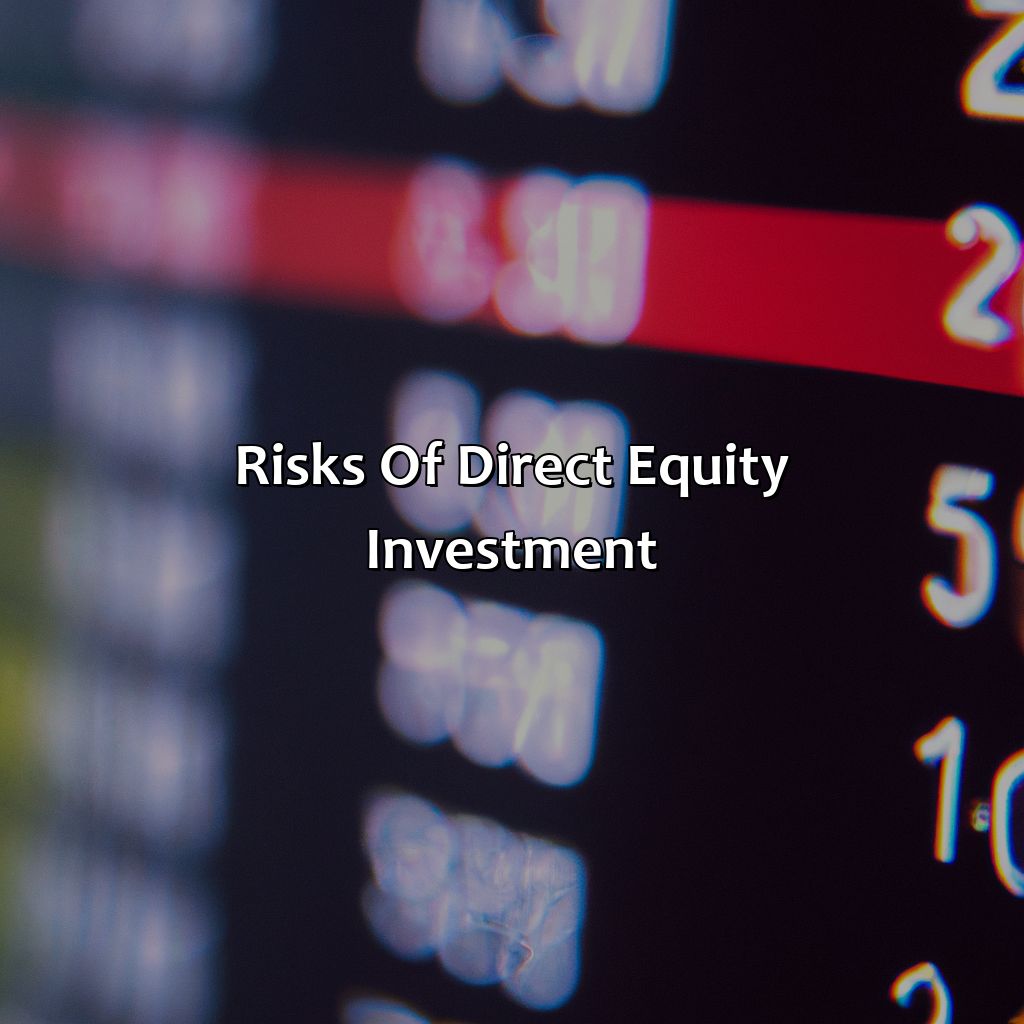What Is Direct Equity Investment?
Key Takeaway:
- Direct equity investment involves investing money directly in a company by buying its stock, which can potentially provide high returns on investment and ownership and control of assets.
- Direct equity investment also offers diversification of investment portfolio, exemption from management fees, and tax benefits. However, it also comes with risks such as market volatility and uncertainty, company-specific risk, and liquidity risk.
- To make an informed decision on direct equity investment, individuals should consider their investment objectives, financial situation and risk tolerance, market research and analysis, and investment horizon.
Are you considering investing in the stock market but don’t know how to go about it? This article provides an overview of one method of investing in stocks, called direct equity investment, and why it’s beneficial. You’ll gain insight into how to get started and the potential risks and rewards.
Benefits of Direct Equity Investment
Direct equity investment offers several benefits. To benefit from them fully, you must understand what they are.
- High returns
- Ownership of assets
- Diversified investment portfolio
- Exemption from management fees and tax advantages
This ‘Benefits of Direct Equity Investment’ section provides insight. It shows why direct equity investment is so lucrative.

Image credits: retiregenz.com by Harry Jones
Potential for High Returns
Direct equity investment has the potential to generate high returns in comparison to other investment options. By investing in stocks, one can benefit from the company’s growth and dividends. The stock market’s volatility can be a challenge, but if invested wisely, it can yield significant returns over time.
Investing in directly owned equities gives investors more control over their investment decisions. They can choose which companies to invest in based on their strategy and research, potentially leading to higher returns than traditional mutual funds or ETFs. Moreover, as shareholder value increases, so does the worth of an investor’s equity stake.
However, with high potential for gain comes greater risk of loss. Direct equity investments are volatile and may fluctuate more than other forms of investments due to various factors such as economic conditions, political issues and industry trends. Therefore, it’s essential to conduct thorough research before making any investment decisions.
It’s evident that direct equity investment offers potential for substantial gains when investing wisely with careful management of risks.
According to Forbes magazine, “Over the long term, stocks have historically averaged about 10% annualized total returns“. Direct equity investment gives you the power to control your assets, just like how pizza toppings give you the power to design your own perfect slice.
Ownership and Control of Assets
Investment in stocks, shares, and securities that yield ownership of assets and offer control over them is known as Asset Ownership and Control. Several benefits come with investing directly into equities, including capital appreciation, dividend income, and control over voting rights.
| Benefits | Description |
| Capital Appreciation | The rise in the value of investments over time. |
| Dividend Income | Regular cash payouts received by owners on a fixed interval basis from company profits or reserves. |
| Voting Rights | Direct investors have the right to attend annual general meetings (AGMs) and vote on resolutions for electing directors, approving auditor’s appointment or removal, setting compensation levels for executives, etc. |
Being a direct investor provides more control and transparency regarding which companies they invest in compared to being part of a mutual fund. Investors can perform due diligence on the management structure, financial health, future prospects, risk exposure before purchasing any equity.
Recently some controversies around management decisions have emphasized the importance of holding voting rights. For example, shareholders played an active role when Nissan’s former chairman was accused of financial misconduct during 2018. Though he initially denied the allegations against him, Nissan CEO addressed his inability to combat such behavior by strengthening the company’s internal controls governance structure at subsequent AGMS as per shareholders’ advice.
Understanding asset ownership and control is crucial as it enables individuals to reflect their values while investing. It can allow for long-term wealth creation through potential tax deductions or capital acquisition rather than short-term gains via speculation over market swings. With diversification, you can ensure that your investment portfolio is like a well-balanced diet – consisting of different assets that keep you healthy and full.
Diversification of Investment Portfolio
Investment portfolio differentiation assists in managing risks associated with investment, leading to increased profit potential. Allocating funds across various companies and sectors through direct equity investment reduces the impact of market fluctuations on overall returns.
Through diversified investment portfolios, investors can avoid having all their eggs in one basket and spread the risk throughout multiple investments. For instance, investing in high-profit sectors such as technology and healthcare while balancing it with established businesses provides opportunities for long-term growth and stability.
Investors should also consider diversifying at the company level. It is essential to consider various aspects of a business before investing, including debt-to-equity ratio, cash flow, past earnings records, market share among competitors, and future projections.
Pro Tip: Before venturing into direct equity investment solely based on stock price fluctuation, take time to understand the company’s fundamentals first.
Say goodbye to the middleman and hello to more money in your pocket with direct equity investment’s exemption from pesky management fees.
Exemption from Management Fees
By investing directly in equity, investors can enjoy exemption from costly management fees that are typically associated with indirect investments. This means that more of the investor’s money is going towards purchasing the actual stocks, potentially leading to higher returns. The absence of management fees also allows for greater flexibility and control over investment decisions.
Furthermore, direct equity investment enables investors to have a greater say in the companies they invest in, as they are able to vote on important matters such as board elections and corporate actions. This level of involvement can lead to a deeper sense of connection and satisfaction with an investment portfolio.
It is also worth noting that while direct equity investment requires a certain level of knowledge and research on behalf of the investor, there are many resources available to facilitate this process. Online platforms now offer easy-to-use tools for researching and analyzing different companies and stocks, making it easier than ever before for individuals to take a hands-on approach to their investments.
In fact, one example of how direct equity investment can pay off comes from entrepreneur Mark Cuban who made his fortune through stock trading before becoming a billionaire through numerous successful business ventures. By investing directly in individual stocks rather than mutual funds or other financial products, Cuban was able to maximize his profits by leveraging his expertise and intuition in the market.
Saving on taxes is like finding money in your pocket that you didn’t even know was there, except with direct equity investment, you’re the one putting it there.
Tax Benefits
Investing directly in equities can provide tax advantages for investors. By purchasing shares of stock, investors may benefit from long-term capital gains rates, which are typically lower than ordinary income tax rates. Additionally, some companies pay dividends that may be taxed at a reduced rate as well. These benefits can help investors keep more of their earnings and increase overall returns.
Furthermore, one may also be able to offset any losses against future gains or even against other income streams in some cases, through mechanisms such as tax-loss harvesting. Moreover, investing in equities through retirement accounts like IRAs and 401(k)s can provide added tax benefits for eligible investors.
It’s worth noting that all investments carry risks and taxes are only one aspect to consider when evaluating investment opportunities. As always, it’s important for investors to consult with a financial advisor or CPA to weigh the potential benefits and drawbacks before making any investment decisions.
It is recommended for investors to research and select quality stocks carefully while keeping the tax implications in mind and hold onto them for the long term to maximize returns without triggering unnecessary taxes. Additionally, periodically rebalancing one’s portfolio can help manage potential tax liabilities while staying aligned with one’s long-term investment objectives.
Direct equity investment: where you get to experience the thrill of playing the stock market without the movie montage of you losing everything.
Risks of Direct Equity Investment
Understand the risks of equity investment? You need to know the potential problems. Volatility, company-specific risk, and liquidity risk are the key areas to look at. Get a grasp of them to better manage the risks.

Image credits: retiregenz.com by Yuval Jones
Market Volatility and Uncertainty
Direct equity investment can be impacted by market unpredictability and instability, resulting in magnified risks for investors. The economic climate, political uncertainties, global issues, and natural disasters can all have adverse effects on the market’s overall performance. This impact can cause significant plunges in share prices leading to investors losing capital gains within a short period.
Moreover, there has been an increase in market volatility recently, meaning that even blue-chip stocks are no longer a safe investment for many investors. While some sectors of the economy may perform well during turbulent times, others may suffer redundancies or undergo insolvency procedures. It is essential to study the market trends thoroughly as investing during peak seasons may result in higher stock prices but also comes with higher risks.
Investors should weigh their options before making any direct equity investments and seek expert guidance from financial professionals who specialize in risk management strategies that cater to extreme market conditions. Diversification through asset classes such as exchange-traded funds or mutual funds can help mitigate the inherent risks associated with these investments.
One possible strategy could be hedging one’s portfolio against downside risks by investing small amounts of money regularly instead of taking significant positions at once. Adopting a more patient approach and playing for business expansion plans rather than quick profit-taking could also reduce overall risk exposure while retaining better returns on investments in the long run.
Directly investing in a company is like betting on a horse – if it wins, you’ll be rich, but if it breaks a leg, well, you’re out of luck.
Company-Specific Risk
One of the risks associated with investing in a particular company is its idiosyncratic peril. The risk is company-specific and arises due to factors peculiar to that particular company only. This inherent risk arises from factors like management quality, governance structure, competitive position, market conditions, financial health, and solvency of the firm.
While making direct equity investment decisions, the investors should perform extensive research on the details mentioned above. The investors must analyze multiple sources of information such as news articles, analyst reports, and financial statements to ascertain whether a firm’s fundamentals would make it profitable in the long run or not. Investors must also keep an eye on how management addresses various challenges which can arise over time.
Specifically speaking, a company-specific risk may occur due to an abrupt drop in demand for a product/service offered by that specific firm or regulatory changes affecting that industry sector permanently. Thus, by investing in individual stocks rather than diversified portfolios or funds, an investor increases the chances of suffering losses due to companies’ specific risks.
Mitigating this danger does not imply avoiding direct equity investments; instead, it relies on adequately researching a prospective business and ensuring that the invested amount is financially sound enough if things take an unexpected turn. It’s essential to understand different types of risks before making any investment commitments thoroughly.
Direct equity investments come with their own set of opportunities but need patience and persistence throughout an investor’s journey. Therefore, while deciding upon one’s equity portfolio mix or indulging in stock-picking activities, understanding and considering idiosyncratic risks is crucial when venturing into direct equity investment alternatives.
If you ever find yourself in a financial pickle, just remember that direct equity investment is like owning a racehorse – it may bring in great returns, but only if you can find a buyer willing to take it off your hands.
Liquidity Risk
Direct equity investment involves buying and holding shares in a company. In this process, investors face liquidity hazards, which refers to the inability to sell shares quickly or at a fair price without affecting it.
This risk often occurs due to low demand for the shares or lack of buyers who are willing to purchase them. In such situations, investors may have to compromise on the sale price and end up selling their shares at a much lower value, resulting in losses.
To mitigate liquidity dangers, investors should have a diverse portfolio with investments across various sectors. Additionally, investing in large-cap companies allows investors to benefit from more extensive investor interest that provides higher liquidity options.
Investors should also stay updated with market trends and news related to the companies they invest in to make better decisions regarding selling their stocks. Regular research helps an investor understand their holdings’ performance potential and reduce risks associated with limited liquidity.
Before investing in direct equity, remember that even the best stock pickers can’t predict a pandemic or Elon Musk’s Twitter rants.
Factors to Consider Before Investing in Direct Equity
Four key elements to bear in mind for direct equity investments: investment objective, financial situation, research and analysis, and investment horizon.
Your objectives must match your finances and risk willingness. Do thorough research and market analysis to make a knowledgeable decision. Lastly, the length of time you plan to invest must be taken into account.

Image credits: retiregenz.com by Yuval Washington
Investment Objective
As an investor, it is prudent to have a clear understanding of your desired outcomes in direct equity investing. You should consider the time horizon for achieving returns, whether you are investing for income or capital growth, and how much risk is acceptable.
In addition to investment objectives, other factors to consider include the investor’s financial resources and investment experience. It is also essential to recognize that there may be market risks associated with direct equity investments, such as stock price volatility. Therefore, it is crucial to understand these risks before making any investments.
When deciding on your investment objectives, it is critical to seek professional advice from a qualified financial advisor. They can help you assess your investment goals and determine the best strategies to achieve them.
Pro Tip: Before committing funds to any investment in direct equity, conduct thorough research on your portfolio of choice and have clear criteria and objectives that guide your decision-making process. Make sure your risk tolerance is higher than your cholesterol level before jumping into direct equity investment.
Financial Situation and Risk Tolerance
When considering investing in direct equity, one should evaluate their current financial situation and risk tolerance. It involves analyzing one’s financial resources, goals, and investment horizon along with their willingness to take risks. It is crucial to determine the amount of money an individual can invest without compromising their immediate financial needs.
The level of risk tolerance depends on various factors, including age, employment status, financial obligations and liabilities, and investment experience. One must also consider external factors such as market volatility and economic conditions while assessing their comfort zone for risk. Additionally, evaluating one’s investment style and portfolio diversification strategies can help manage potential risks.
It is important to note that the right mix of equity investments should align with an individual’s life goals. When unsure about direct equity opportunities, they can seek professional advice from financial advisors or dedicated online platforms for guidance on portfolio construction.
Ignoring the importance of understanding one’s financial situation before investing can lead to unnecessary losses or missed opportunities for wealth creation. One must be wary of being influenced by social media hype or personal biases towards certain types of stocks. Therefore a systematic approach that suits an individual’s needs instead of blindly following hearsay is recommended.
Market research and analysis: because a blind investment is like playing darts in the dark, and you’re not even sure if you’re aiming for the right target.
Market Research and Analysis
One crucial aspect of investing in direct equity is conducting market research and analysis to ensure informed decisions. This involves assessing various macro and microeconomic factors, analyzing trends and patterns, scrutinizing valuation metrics, and identifying potential risks and opportunities. By doing so, investors can make well-informed decisions that increase their chances of making profits while mitigating the likelihood of incurring losses.
Investors should also consider analyzing company reports and financial statements, understanding their business model and competition, evaluating the management’s track record, and examining the sector they operate in. Conducting thorough research enables investors to have a clear idea of the company’s strengths, weaknesses, opportunities, and threats.
Moreover, it is important to stay updated with relevant news articles that affect investments. Such information includes regulatory changes or government policies that impact sectors or companies’ performance. Investors should regularly review their portfolio to identify growth prospects within a specific industry by tracking different stock-market indices such as BSE Sensex or NIFTY 50.
To invest in direct equity profitably is possible if investors adhere to certain precautions like diversification across fundamentally strong stocks or considering long-term goals. It helps avoid unnecessary losses that may arise from overexposure to individual stocks’ volatility or chasing short-term returns. Therefore due diligence on these aspects can provide successful outcomes for profitable investments.
If your investment horizon is shorter than a TikTok dance, direct equity might not be for you.
Investment Horizon
When deciding on the ideal time frame for entering into direct equity investments, it’s essential to consider your financial goals and objectives. The length of time that one is willing to invest for plays a vital role in the decision-making process, and therefore should be monitored carefully. Profit targets, risk tolerance and current market patterns also need to be evaluated.
Investment Horizon can influence investment management decisions; thus, investing in direct equities requires a clear idea of how long the money will remain in the market before exiting. Typically, investors with a longer time horizon can manage high-risk opportunities more easily than those only holding positions for a shorter period.
With this in mind, it becomes important to understand the viability of long-term investments during different economic stages. Focusing on potential market corrections when initiating an investment strategy may not suit every investor type and can cause significant losses if misunderstood. So it’s advisable to conduct proper research before deciding on any single investment.
In history, significant market corrections have led to changes in gains across individual stocks and sectors. This means that the optimal time for early-stage investing programs is soon after a correction rather than during times of peak bull markets.
Five Facts About Direct Equity Investment:
- ✅ Direct equity investment is buying stocks directly from a company, rather than through a broker or mutual fund. (Source: The Balance)
- ✅ Direct equity investment allows for more control over investment decisions and potentially higher returns. (Source: Investing Basics)
- ✅ Direct equity investment carries more risk than other investment options due to the volatility of the stock market. (Source: Forbes)
- ✅ Successful direct equity investment requires research and analysis of individual companies and industries. (Source: Investopedia)
- ✅ Many investors use a combination of direct equity investment and other investment options to diversify their portfolio. (Source: The Motley Fool)
FAQs about What Is Direct Equity Investment?
What is direct equity investment?
Direct equity investment is a type of investment strategy in which an individual buys shares of a company directly, without involving any third-party intermediaries such as mutual fund or exchange-traded funds (ETFs). This is also referred to as buying or investing in stocks.
How does direct equity investment work?
Direct equity investment allows an individual to become a shareholder of a company. The investor buys a specific number of shares of the company at a certain price, which entitles the investor to a portion of the company’s profits and voting rights.
What are the benefits of direct equity investment?
Direct equity investment provides investors with the potential for high returns, as well as the ability to directly control their investments. Additionally, investors can choose which companies they want to invest in, giving them greater control over their investment portfolio.
What are the risks associated with direct equity investment?
Direct equity investment carries several risks, including the possibility of losing money if the company’s stock price declines. Other risks include the potential for economic downturns, changes in industry trends, and company-specific issues.
How much money is needed for direct equity investment?
The amount of money needed for direct equity investment can vary greatly depending on the company in question and the number of shares the investor wishes to purchase. Many brokerages allow investors to start with as little as $500 or less.
How can an investor research potential companies for direct equity investment?
Investors can research potential companies for direct equity investment through various resources such as financial news and analysis websites, annual reports, and company filings with the Securities and Exchange Commission (SEC). Financial advisors can also provide guidance on potential investments.
